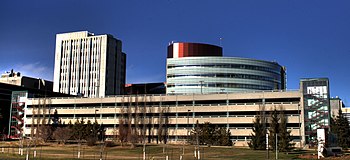 |
| British nurse in nurses' station. (Photo credit: Wikipedia) |
What you need to know about becoming a nurse in Ontario.
Ontario welcomes internationally educated nurses (IENs) who willingly want to relocate and even has a specific government program in place to enable them to practice and excel in the shortest time possible. However all nurses, regardless of background must successfully accomplish the same steps as Ontario nursing students, including:
*Getting licensed or registered by the College of Nurses of Ontario. This entails writing the national registered nurse examination as part of the registration program.
Learn more at Four Steps to Become a Registered Nurse.
The CARE Program
Since 2001, a bridging program called CARE (Creating Access to Regulated Employment for Nurses), has assisted more than 1000 internationally educated nurses from over 140 countries to become registered nurses in Ontario. The program’s facets include supporting language requirements, an alumni networking group of CARE nurses, registered nursing exam preparation assistance, and observational job shadowing.
An evaluation of the initiative revealed that the CARE program doubled the success rate for internationally educated nurses writing the registration exam to 66 per cent from 33 per cent.
International RNs will need to obtain a visa to study or work in Canada. Contact a Canadian embassy or consulate regarding the criteria and procedures. To work in Canada, you may need an offer of employment.
Source: http://careersinnursing.ca/new-nursing-and-students/becoming-registered-nurse
*Getting licensed or registered by the College of Nurses of Ontario. This entails writing the national registered nurse examination as part of the registration program.
Learn more at Four Steps to Become a Registered Nurse.
Becoming a Registered Nurse
If you are interested in caring for people and are a high school graduate, you can eventually become a Registered Nurse (RN). There are some steps you need to take before you can turn your dream into a career, but they are straightforward and you’ll find there is plenty of support along the way. If you are interested in becoming a Nurse Practitioner, the steps follow below.
Step #1. You will need a post-secondary education.
Why? All provincial and territorial nurses’ associations have adopted the goal of having a baccalaureate requirement for entry into nursing. Evidence supports the fact that baccalaureate-prepared nurses are most able to provide safe, ethical, cost-effective and high-quality nursing care for Canadians.
The trend toward a university education for Registered Nurses (RNs) is here: with the exception of students in Quebec, students must choose to obtain a baccalaureate degree in nursing in order to prepare for an RN career.
All nursing graduates who plan to practice in Ontario must be registered with the CNO.
Once you are deemed eligible (after applying), you’ll take the registration exam. Why? This exam is designed to measure the competencies of nurses at the start of your practice.
In addition to the registration exam, you must successfully complete a separate jurisprudence exam by the College designed to evaluate your knowledge and understanding of the laws, regulations, and College by-laws, practice standards and guidelines that govern the nursing profession in Ontario. The RN Jurisprudence Exam is completed online.
Step #3. If you pass, you must meet four other requirements to be “registered” by a provincial or territorial nursing regulatory body in Canada.
After completing an eligible education program, showing the College evidence of recent safe nursing practice (usually completing the program) as well as successful completion of the national nursing registration examination; you must then show:
Step #4. Evolve your competencies.
Because nursing is a self-regulating profession, establishing and maintaining high standards of practice is critical — not only for the safety of patients but also the long-term advancement of the nursing profession. Researching and expanding nursing competencies through best practice development is another important contribution RNs can make after they begin to practice.
How to Become a Nurse Practitioner
In Ontario, Registered Nurses (RNs) with additional education and experience are in the Extended Class, also known as Nurse Practitioners (NPs). NPs have an expanded scope of practice including the ability to order and interpret diagnostic tests, communicate diagnoses, prescribe prescription drugs, and perform specific procedures.
NP is a protected title in Ontario (since August 2007). There are four NP specialty certificates within the Extended Class: NP-Primary Health Care, NP-Pediatric, NP-Adult, and NP-Anesthesia.
To become an NP in Ontario:
Step #1. You will need a post-secondary education.
Why? All provincial and territorial nurses’ associations have adopted the goal of having a baccalaureate requirement for entry into nursing. Evidence supports the fact that baccalaureate-prepared nurses are most able to provide safe, ethical, cost-effective and high-quality nursing care for Canadians.
The trend toward a university education for Registered Nurses (RNs) is here: with the exception of students in Quebec, students must choose to obtain a baccalaureate degree in nursing in order to prepare for an RN career.
- Check out a complete list of nursing schools and continuing education options.
- Check out where to apply for nursing financial assistance here.
All nursing graduates who plan to practice in Ontario must be registered with the CNO.
Once you are deemed eligible (after applying), you’ll take the registration exam. Why? This exam is designed to measure the competencies of nurses at the start of your practice.
In addition to the registration exam, you must successfully complete a separate jurisprudence exam by the College designed to evaluate your knowledge and understanding of the laws, regulations, and College by-laws, practice standards and guidelines that govern the nursing profession in Ontario. The RN Jurisprudence Exam is completed online.
Step #3. If you pass, you must meet four other requirements to be “registered” by a provincial or territorial nursing regulatory body in Canada.
After completing an eligible education program, showing the College evidence of recent safe nursing practice (usually completing the program) as well as successful completion of the national nursing registration examination; you must then show:
- Evidence of fluency in written and spoken
English or French. - Registration or eligibility for registration in the jurisdiction where a nursing program was completed.
- Proof of Canadian Citizenship, Permanent Residency, or authorization under the Immigration and Refugee Protection Act (Canada) to engage in the practice of nursing. *Good character and suitability to practice, as indicated by a Declaration of Registration Requirements and a Canadian Criminal Record Synopsis.
- What if I’m an internationally educated nurse?
Step #4. Evolve your competencies.
Because nursing is a self-regulating profession, establishing and maintaining high standards of practice is critical — not only for the safety of patients but also the long-term advancement of the nursing profession. Researching and expanding nursing competencies through best practice development is another important contribution RNs can make after they begin to practice.
How to Become a Nurse Practitioner
In Ontario, Registered Nurses (RNs) with additional education and experience are in the Extended Class, also known as Nurse Practitioners (NPs). NPs have an expanded scope of practice including the ability to order and interpret diagnostic tests, communicate diagnoses, prescribe prescription drugs, and perform specific procedures.
NP is a protected title in Ontario (since August 2007). There are four NP specialty certificates within the Extended Class: NP-Primary Health Care, NP-Pediatric, NP-Adult, and NP-Anesthesia.
To become an NP in Ontario:
- RNs must have obtained advanced education;
- demonstrate evidence of safe practice; and
- have passed an approved registration exam
for the specialty certificate they want to pursue.
Since 2001, a bridging program called CARE (Creating Access to Regulated Employment for Nurses), has assisted more than 1000 internationally educated nurses from over 140 countries to become registered nurses in Ontario. The program’s facets include supporting language requirements, an alumni networking group of CARE nurses, registered nursing exam preparation assistance, and observational job shadowing.
An evaluation of the initiative revealed that the CARE program doubled the success rate for internationally educated nurses writing the registration exam to 66 per cent from 33 per cent.
International RNs will need to obtain a visa to study or work in Canada. Contact a Canadian embassy or consulate regarding the criteria and procedures. To work in Canada, you may need an offer of employment.
Source: http://careersinnursing.ca/new-nursing-and-students/becoming-registered-nurse




